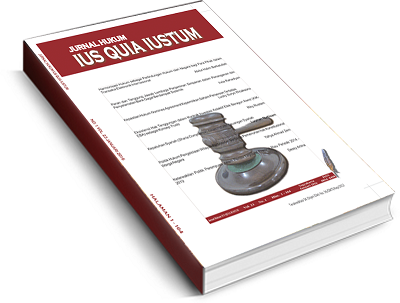Main Article Content
Abstract
Keywords
Article Details
References
- Buku
- Harahap, M. Yahya, Hukum Acara Perdata, Sinar Grafika, Yogyakarta, 2005.
- Islamy, M. Irfan, Prinsip-Prinsip Perumusan Kebijaksanaan Negara, Bumi Aksara, Jakarta, 2014.
- Keban, Yeremias T., Enam Dimensi Strategis Administrasi Publik: Konsep, Teori Dan Isu, Gava Media, Yogyakarta, 2004.
- Mertoksumo, Sudikno, Hukum Acara Perdata Indonesia, Liberty, Yogyakarta, 2014.
- Nurcholis, Hanif, Teori dan Praktik Pemerintahan dan Otonomi Daerah, Penerbit Grasindo, Jakarta, 2005.
- Rimdan, Kekuasaan Kehakiman Pasca Amandemen Konstitusi, Kencana, Jakarta, 2012.
- Suparman, Erman, Arbitase dan Dilema Penegakan Keadilan, Fikahati Aneska dan BANI Arbitration Centre, Jakarta, 2012.
- Wahab, Solichin Abdul, Pengantar Analisis Kebijakan Publik, Universitas Muhammadiyah Malang Press, Malang, 2008.
- Jurnal
- Rakhmawati, Oktaria dan Pudji Astuti, “Implementasi PERMA No. 2 Tahun 2012 Tentang Penyesuaian Batasan Tindak Pidana Ringan Dan Jumlah Denda Dalam KUHP Di Pengadilan Negeri Surabaya”, Novum, Volume 01, No.1, Tahun 2013.
- Sukolegowo, Pramono, Efektivitas Peradilan Sederhana, Cepat, Dan Biaya Ringan Di Lingkungan Peradilan Umum”, Jurnal Dinamika Hukum, Vol.8, No. 1 Januari 2008.
- Warwick, Donald P., “Integrating Planning and Implementation: A Transactional Approach, ” Development Discussion Paper No. 63 Cambridge Mass, Harvard Institute for International Development, June 1979.
- Internet
- Gugatan Sederhana Produk MA Diharapkan Dapat Membantu Pencari Keadilan”, www.suksesinews.com, diakses pada tanggal 13 September 2016.”
- Gugatan Sederhana Demi Peradilan yang Sederhana, Cepat dan Berbiaya Ringan”, www.pshk.or.id, , diakses pada tanggal 14 September 2016.
- “MA Harus Kaji Permasalahan Domisili Dalam PERMA Gugatan Sederhana”, www.kanalhukum.id, diakses pada tanggal 14 September 2016.
- Peraturan Perundang-undangan
- Undang-Undang Dasar Negara Republik Indonesia
- Het Herzien Indonesisch Reglement (HIR), Staatblad 1848 No. 16 jo. Staatblad 1941 No. 44
- Rechtsreglemen Buitengewesten (Rbg), Staatblad 1927 No. 227
- Kitab Undang-Undang Hukum Perdata
- UU No, 14 Tahun 1970 jo. UU No. 4 Tahun 2004 jo. UU No. 48 Tahun 2009 tentang Kekuasaan Kehakiman
- PERMA No. 2 Tahun 2015 Gugatan Sederhana
References
Buku
Harahap, M. Yahya, Hukum Acara Perdata, Sinar Grafika, Yogyakarta, 2005.
Islamy, M. Irfan, Prinsip-Prinsip Perumusan Kebijaksanaan Negara, Bumi Aksara, Jakarta, 2014.
Keban, Yeremias T., Enam Dimensi Strategis Administrasi Publik: Konsep, Teori Dan Isu, Gava Media, Yogyakarta, 2004.
Mertoksumo, Sudikno, Hukum Acara Perdata Indonesia, Liberty, Yogyakarta, 2014.
Nurcholis, Hanif, Teori dan Praktik Pemerintahan dan Otonomi Daerah, Penerbit Grasindo, Jakarta, 2005.
Rimdan, Kekuasaan Kehakiman Pasca Amandemen Konstitusi, Kencana, Jakarta, 2012.
Suparman, Erman, Arbitase dan Dilema Penegakan Keadilan, Fikahati Aneska dan BANI Arbitration Centre, Jakarta, 2012.
Wahab, Solichin Abdul, Pengantar Analisis Kebijakan Publik, Universitas Muhammadiyah Malang Press, Malang, 2008.
Jurnal
Rakhmawati, Oktaria dan Pudji Astuti, “Implementasi PERMA No. 2 Tahun 2012 Tentang Penyesuaian Batasan Tindak Pidana Ringan Dan Jumlah Denda Dalam KUHP Di Pengadilan Negeri Surabaya”, Novum, Volume 01, No.1, Tahun 2013.
Sukolegowo, Pramono, Efektivitas Peradilan Sederhana, Cepat, Dan Biaya Ringan Di Lingkungan Peradilan Umum”, Jurnal Dinamika Hukum, Vol.8, No. 1 Januari 2008.
Warwick, Donald P., “Integrating Planning and Implementation: A Transactional Approach, ” Development Discussion Paper No. 63 Cambridge Mass, Harvard Institute for International Development, June 1979.
Internet
Gugatan Sederhana Produk MA Diharapkan Dapat Membantu Pencari Keadilan”, www.suksesinews.com, diakses pada tanggal 13 September 2016.”
Gugatan Sederhana Demi Peradilan yang Sederhana, Cepat dan Berbiaya Ringan”, www.pshk.or.id, , diakses pada tanggal 14 September 2016.
“MA Harus Kaji Permasalahan Domisili Dalam PERMA Gugatan Sederhana”, www.kanalhukum.id, diakses pada tanggal 14 September 2016.
Peraturan Perundang-undangan
Undang-Undang Dasar Negara Republik Indonesia
Het Herzien Indonesisch Reglement (HIR), Staatblad 1848 No. 16 jo. Staatblad 1941 No. 44
Rechtsreglemen Buitengewesten (Rbg), Staatblad 1927 No. 227
Kitab Undang-Undang Hukum Perdata
UU No, 14 Tahun 1970 jo. UU No. 4 Tahun 2004 jo. UU No. 48 Tahun 2009 tentang Kekuasaan Kehakiman
PERMA No. 2 Tahun 2015 Gugatan Sederhana




